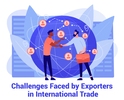Sign up today and be a part of the fastest growing B2B platform
All Categories
Call: +91 842 908 8885
Global Trade Overview - Things You Need to know
- Date posted : January 10, 2023
- Comments : 0

Global trade, which consists of the total imports and exports of each country. It is the exchange of products or services between countries. The price of each good or service sold is determined by supply and demand, with sporadic government interventions. It is crucial for promoting economic expansion, safeguarding quality domestic employment, and raising living standards with reasonably priced goods and services.
The international trade stage not only boosts productivity but also gives nations access to the global economy, promoting the possibility of foreign direct investment (FDI). Theoretically, economies can grow more effectively and readily join the competitive market.
Foreign capital and skills can enter the country through FDI for the receiving government. It increases employment rates and, in theory, boosts the gross domestic product (GDP). FDI offers business expansion and growth for the investor, which results in better revenues.
What is the importance of global trade?
Trade is essential to the world economy's operation because it gives countries access to any resource they want, regardless of whether it is made domestically. The availability of these resources is facilitated via trade.
Through global trading, consumers and nations can access products and services that are either unavailable or more expensive domestically.
Political economists like David Ricardo and Adam Smith were among the first to understand the significance of global trade.
The idea of comparative advantage, introduced by David Ricardo in the 19th century, is a key idea that underpins international trade. The idea of comparative advantage, in its simplest form, holds that a nation can produce some commodities or services more affordably than other nations. Technically speaking, the nation has a lower opportunity cost than others when producing a particular commodity or service.
If we go by the international trade definition then International trade is the buying and selling of commodities and services between businesses in other nations. The global market is used for the purchase and sale of machinery, food, raw resources, and consumer goods.
Market competition has increased as a result of the global trading environment. As a result, prices become more aggressively competitive, bringing down the end product's price for consumers.
What are the types of international trade?
Export Trade- When products made in one nation are bought by citizens of another, this is known as export trade. It can also be used to describe services that are rendered in one nation but are intended for use by people who reside in another. The exporter is the party who is selling the goods or services in this transaction.
Import Trade- It refers to the exchange of products or services between nations for monetary compensation. When necessary goods are not readily available domestically, countries import them. Goods and services that are imported into a country and come from another country are referred to as imports. The word "import" comes from the word "port," which is appropriate given that goods are regularly shipped abroad. Import is also the mainstay of international trade.
Entrepot Trade-Entrepot Trade often referred to as transshipment, is the practice of importing products into a country followed by a second export without first being dispersed there. It is entrepot trade, for instance, if the metal is imported from India to Singapore, processed, and then exported once more to China. This type of trade is utilized for a variety of purposes, such as getting access to equipment, advancing technology, and bolstering international ties.
Let’s discuss some of the international trade examples
Europe began buying natural gas from Qatar in 2022 as opposed to Russia. Russia supplied roughly 40% of Europe's needs for natural gas before the conflict. As a result, Qatar and the US have agreed to several long-term contracts (natural gas imports).
Assume that X and Y are two different nations. X sells rice for a very cheap price (in comparison to Y). X is a country in development. However, despite having a thriving economy, Y cannot grow rice on its land because of the adverse climate and soil. In such a case, X and Y engage in international trade. Y is allowed to purchase from X as much as necessary to meet domestic wants. Likewise, X makes money by making a sale to Y of its excess yield.
Benefits of international trade-
Target Market Expansion & Revenue Growth-The expansion of businesses' target markets and rising demand result in employment growth. Beyond the creation of jobs, a bigger target market permits businesses to operate manufacturing without worrying about overproduction because any surplus products created can be marketed overseas. The possibility for business expansion and revenue growth increases with each new nation a company adds to its list.
More Job opportunities- The international trading environment contributes to job creation by enabling businesses to access new markets. Naturally, manufacturing and service capabilities improve together with the size of the market that is available and the market share. The end outcome is that the working class has access to more job opportunities.
Enhancing Risk Management- International trade provides the chance for market diversification in addition to a greater target market size. When a business primarily concentrates on its market, there is a greater risk from economic downturns, climatic changes, political sway, and many other risk factors. Companies lower the possible hazards associated with their primary business by diversifying away from one specific market.
A wider range of products- Consumers and nations have the chance to buy goods and services that are either unavailable or more expensive to create outside of their borders with the help of international trade. This is one of the major advantages of international trade. The effects of global export trading can be easily seen by going to your neighborhood supermarket or electronics store.
Better international relations- Strong links of collaboration in various sectors might develop from the economic interconnectedness of nations brought about by international business trade and the global trade point network. Global trade and its growth allow countries to expand their relations.
Improvement of Company Reputation- The reputation of a business inside the worldwide market can be improved by trading internationally. A company's ability to conduct business successfully in one nation has a big impact on how well-positioned it is to do so in nearby and adjacent nations. When a corporation targets an entire region rather than just one or two countries, the increase in confidence it enjoys can have a significant influence, although being difficult to measure.
Specialization Options-
Companies that participate in the global volume of trade may be given the chance to specialize in a certain field to meet the needs of a specific market. Countries can look to trade with other nations to obtain goods or services that they are unable to produce effectively domestically. These changes to specialize frequently result in enhanced production efficiency, higher levels of innovation, and higher-quality development. Companies may benefit from a sustained competitive edge and increase in terms of their worldwide market share as a result.
What Are Typical Difficulties in global trade content?
The practices that governments enact to the nature of international trade and defend home markets are known as trade barriers. These include standardization, import and export permits, tariffs, quotas, and subsidies.
The significance of international trade demonstrates that it has increased the interdependence of the world's economies, and most economies place a high priority on international commerce. As a result of the increased competition and options it gives consumers, firms are forced to manufacture things that are both affordable and of excellent quality, which is good for these customers.
Types of Trade barriers-
Natural Barriers- Natural trade barriers are those imposed by nature or brought on by cultural conflicts between nations.
For example, It is difficult for countries to the east of Afghanistan, such as India or China, to cross the mountains and enter the country. Despite infrastructure improvements, the importation of products remains challenging.
Tariff limitations- A levy levied on imported goods is referred to as a tariff. A tariff may be imposed on a certain nation or a specific good. The most popular method of placing a trade barrier against another nation is through tariffs. The term "protectionism" refers to a government policy of enforcing economic barriers to protect domestic producers from the international competition so that they are not forced to compete with more advanced technology and so that domestic employment is not negatively impacted by foreign competition.
Non-Tariff limitations- Any trade restrictions that are not tariffs fall under this category. Import licenses, export controls, import quotas, subsidies, voluntarily imposed export restrictions, embargoes, and currency devaluation are a few examples of these.
In times of hardship, the government may limit the export of some commodities. This is known as export control.





















Leave a comment